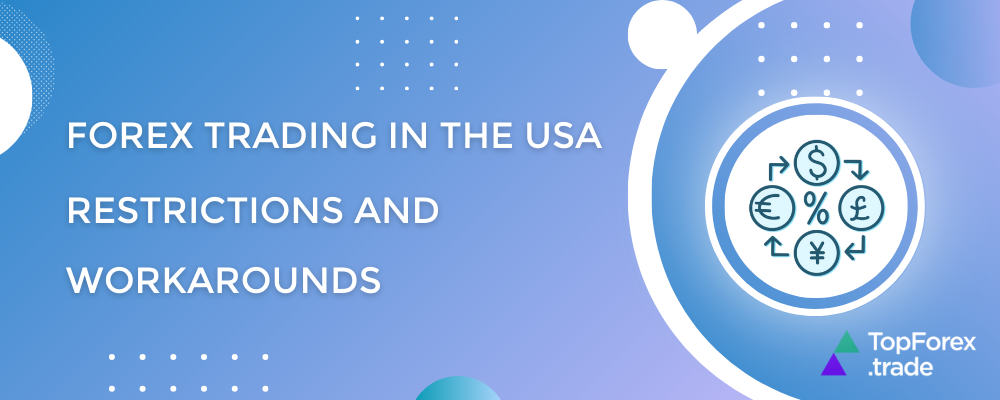Why Forex trading in the U.S.: restrictions and workarounds

The foreign exchange (Forex) market is the largest and most liquid financial market in the world, with a daily trading volume exceeding $6 trillion. However, traders in the United States face significantly stricter regulations compared to traders in Europe, Asia, or other regions. These restrictions impact leverage, broker availability, and trading strategies, making Forex trading more challenging for U.S.-based investors.
In this article, we will explore:
- Why the U.S. imposes strict Forex trading regulations
- How traders adapt to these restrictions
- The top 5 Forex brokers available for U.S. traders (and alternatives for non-U.S. traders)
Why is Forex trading heavily regulated in the U.S.?

The Commodity Futures Trading Commission (CFTC) and the National Futures Association (NFA) enforce strict rules on Forex trading to protect retail investors from excessive risk, fraud, and market manipulation. Here are the key reasons behind these restrictions:
1. Lower leverage limits (50:1 for majors, 20:1 for minors)
- Unlike brokers in Europe or offshore jurisdictions that offer 500:1 or even 1000:1 leverage, U.S. traders are limited to 50:1 for major currency pairs and 20:1 for minors.
- Reason: High leverage can lead to massive losses, and regulators aim to protect inexperienced traders from blowing their accounts.
2. FIFO rule (first in, first out)
- U.S. traders cannot hedge positions (i.e., they must close trades in the order they were opened).
- This rule prevents traders from holding multiple opposing positions on the same currency pair.
3. Higher capital requirements for brokers
- Forex brokers operating in the U.S. must maintain higher capital reserves, reducing the risk of insolvency.
- This makes it harder for scam brokers to operate, but also limits the number of available brokers.
4. No bonuses or aggressive marketing
-
U.S. brokers cannot offer deposit bonuses, high-risk incentives, or misleading promotions, unlike some offshore brokers.
5. Limited broker options
-
Due to strict regulations, many international brokers (like Exness, XM, and IC Markets) do not accept U.S. clients.
How U.S. Forex traders adapt to these restrictions

Despite the limitations, traders find ways to navigate the market effectively. Here’s how:
1. Using offshore brokers (with caution)
- Many traders establish accounts with reputable offshore brokers
- Important note: While not CFTC-regulated, these brokers maintain licenses with respected authorities, including:
- FCA (UK)
- ASIC (Australia)
- CySEC (Cyprus)
- FMA (New Zealand)
- These regulatory bodies provide substantial investor protections, albeit different from U.S. standards
2. Joining FX prop firms
- Proprietary trading firms allow traders to use the firm’s capital in exchange for a profit split.
- These firms often provide higher leverage and better trading conditions than retail brokers.
3. Switching to swing or position trading
-
Since scalping is difficult with low leverage, many traders shift to longer-term strategies (swing or position trading).
➡ Forex swing trading case study: key indicators and pro tips
4. Trading Forex futures instead of spot Forex
-
Some platforms offer futures trading with different leverage rules.
5. Using CFDs (outside the U.S.)
-
Non-U.S. traders often use CFD brokers (like Plus500) for Forex exposure with flexible leverage.
Top 4 Forex brokers for the U.S. traders (and alternatives for non-U.S. traders)
Since U.S. traders have limited options, here are the best-regulated brokers available (for US and non-U.S. traders):
OANDA – best for U.S. traders (CFTC-regulated)
- Why? One of the few trusted brokers fully compliant with U.S. regulations (CFTC/NFA).
- Pros:
✅ Tight spreads & reliable execution
✅ No minimum deposit
✅ Strong regulatory oversight -
Cons:
❌ Max 50:1 leverage (U.S. restriction)
❌ No bonus offers
Exness – best for high leverage (offshore)
- Why? Offers some of the highest leverage (up to Unlimited for certain accounts).
- Regulation: CySEC, FCA, FSCA
- Pros:
✅ Instant withdrawals
✅ Low minimum deposit ($10)
✅ Raw spread accounts available -
Cons:
❌ Not available for U.S. traders
❌ Limited research tools
BlackBull Markets – best for ECN trading (low spreads)
- Why? True ECN execution with deep liquidity.
- Regulation: FMA (New Zealand), FSA (Seychelles)
- Pros:
✅ Ultra-tight spreads (from 0.0 pips)
✅ Fast execution (under 30ms)
✅ Supports MetaTrader 4 & 5 -
Cons:
❌ Not available for U.S. clients
XM Group – best for beginners (easy-to-use)
- Why? Excellent educational resources and low entry barrier.
- Regulation: CySEC, ASIC, IFSC
- Pros:
✅ $5 minimum deposit
✅ Free trading signals and webinars
✅ No requotes -
Cons:
❌ Spreads slightly wider than ECN brokers
Related articles:
Forex trading in the USA - FAQ